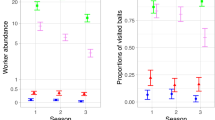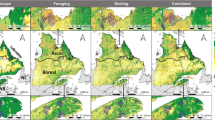Abstract
Waterholes are critically important to animal survival in dry habitats but are also a potential source of parasite exposure. Avoiding feces may effectively reduce parasite transmission risk, but may also impose costs, including greater travel distances to locate less contaminated resources. We studied factors influencing wild, water-dependent red-fronted lemurs’ (Eulemur rufifrons) selection of waterholes, including factors related to trade-offs between energy expenditure and parasite avoidance. Research took place in a dry deciduous forest in western Madagascar characterized by water scarcity during a pronounced local dry season. We tested whether fecal contamination influenced lemurs’ water selection with an experiment that gave lemurs a choice between clean and fecally contaminated water disinfected by boiling. We also monitored lemurs’ use of natural waterholes to determine how conspecific fecal contamination and travel distance influenced lemurs’ use of waterholes. Red-fronted lemurs displayed a strong preference for clean water in the experiment. At natural waterholes, we found a significant negative interaction between frequency of previous lemur visits and fecal contamination, and a longer return time to waterholes with increasing fecal contamination, revealing that lemurs returned to less contaminated waterholes more frequently and sooner. We also found that lemurs prioritized shorter travel distances over feces avoidance. Together, these results suggest that red-fronted lemurs exercised their preferences for avoiding parasite risk in their natural waterhole choices by avoiding highly contaminated waterholes, especially when waterholes were equidistant. Thus, fecal contamination and travel distance influence water selection in water-scarce habitats, with potential impacts on habitat use and ecological interactions.
Significance statement
Animals can take many measures to avoid becoming infected with parasites. One strategy involves avoiding reliable indicators of parasite presence, such as feces. Although avoiding feces may have many benefits, it may also have costs, such as when essential resources, like waterholes in a dry forest, inevitably become contaminated by the animals that use them. Using a choice experiment, we demonstrated that wild red-fronted lemurs preferred to avoid fecal contamination of water sources. From observations of lemurs’ waterhole choices, we determined that lemurs exercised this preference most when choosing among nearby waterholes, thus prioritizing energy conservation, and secondarily reducing the costs of parasite exposure risk. Avoidance of feces may thus have effects on lemurs’ patterns of habitat use and ecological interactions.



Similar content being viewed by others
Data availability
The datasets generated and analyzed during the current study are available from the corresponding author on reasonable request.
References
Amoroso CR, Frink AG, Nunn CL (2017) Water choice as a counterstrategy to faecally transmitted disease: an experimental study in captive lemurs. Behaviour 154:1239–1258. https://doi.org/10.1163/1568539X-00003466
Barasona JA, Vicente J, Díez-Delgado I, Aznar J, Gortazar C, Torres MJ (2017) Environmental presence of Mycobacterium tuberculosis complex in aggregation points at the wildlife/livestock Interface. Transbound Emerg Dis 64:1148–1158. https://doi.org/10.1111/tbed.12480
Bouwman KM, Hawley DM (2010) Sickness behaviour acting as an evolutionary trap? Male house finches preferentially feed near diseased conspecifics. Biol Lett 6:462–465. https://doi.org/10.1098/rsbl.2010.0020
Buttelmann D, Tomasello M (2013) Can domestic dogs (Canis familiaris) use referential emotional expressions to locate hidden food? Anim Cogn 16:137–145. https://doi.org/10.1007/s10071-012-0560-4
Clough D (2010) Gastro-intestinal parasites of red-fronted lemurs in Kirindy Forest, western Madagascar. J Parasitol 96:245–251. https://doi.org/10.1645/GE-2258.1
Clough D, Heistermann M, Kappeler PM (2010) Host intrinsic determinants and potential consequences of parasite infection in free-ranging red-fronted lemurs (Eulemur fulvus rufus). Am J Phys Anthropol 142:441–452. https://doi.org/10.1002/ajpa.21243
Curtis VA (2014) Infection-avoidance behaviour in humans and other animals. Trends Immunol 35:457–464. https://doi.org/10.1016/j.it.2014.08.006
Elff M (2009) Social divisions, party positions, and electoral behaviour. Elect Stud 28:297–308. https://doi.org/10.1016/j.electstud.2009.02.002
Fichtel C, Hammerschmidt K (2002) Responses of redfronted lemurs to experimentally modified alarm calls: evidence for urgency-based changes in call structure. Ethology 108:763–777. https://doi.org/10.1046/j.1439-0310.2002.00816.x
Fichtel C, Kappeler PM (2002) Anti-predator behavior of group-living Malagasy primates: mixed evidence for a referential alarm call system. Behav Ecol Sociobiol 51:262–275
Franz M, Kramer-Schadt S, Greenwood AD, Courtiol A (2018) Sickness-induced lethargy can increase host contact rates and pathogen spread in water-limited landscapes. Funct Ecol 32:2194–2204. https://doi.org/10.1111/1365-2435.13149
Fritzsche A, Allan BF (2012) The ecology of fear: host foraging behavior varies with the spatio-temporal abundance of a dominant ectoparasite. Ecohealth 9:70–74. https://doi.org/10.1007/s10393-012-0744-z
Hart BL (2011) Behavioural defences in animals against pathogens and parasites: parallels with the pillars of medicine in humans. Philos Trans R Soc B 366:3406–3417. https://doi.org/10.1098/rstb.2011.0092
Hutchings MR, Kyriazakis I, Papachristou TG, Gordon IJ, Jackson F (2000) The herbivores’ dilemma: trade-offs between nutrition and parasitism in foraging decisions. Oecologia 124:242–251. https://doi.org/10.1007/s004420000367
Hutchings MR, Kyriazakis I, Gordon IJ (2001) Herbivore physiological state affects foraging trade-off decisions between nutrient intake and parasite avoidance. Ecology 82:1138–1150. https://doi.org/10.1890/0012-9658(2001)082[1138:HPSAFT]2.0.CO;2
Jackson S, Nicolson SW, Lotz CN (1998) Sugar preferences and “side bias” in cape sugarbirds and lesser double-collared sunbirds. Am Ornithol Union 115:156–165. https://doi.org/10.2307/4089120
Kappeler PM, Erkert HG (2003) On the move around the clock: correlates and determinants of cathemeral activity in wild redfronted lemurs (Eulemur fulvus rufus). Behav Ecol Sociobiol 54:359–369. https://doi.org/10.1007/s00265-003-0652-x
Kappeler PM, Fichtel C (2012) A 15-year perspective on the social organization and life history of the sifaka in Kirindy Forest. In: Kappeler PM, Watts DP (eds) Long-Term Field Studies of Primates. Springer-Verlag, Berlin, pp 101–121
Kokko H, Ranta E, Ruxton G, Lundberg P (2002) Sexually transmitted disease and the evolution of mating systems. Evolution 56:1091–1100. https://doi.org/10.1111/j.0014-3820.2002.tb01423.x
Moore J (2002) Parasites and the behavior of animals. Oxford University Press, New York
Müller-Graf CD, Collins DA, Packer C, Woolhouse ME (1997) Schistosoma mansoni infection in a natural population of olive baboons (Papio cynocephalus anubis) in Gombe Stream National Park, Tanzania. Parasitology 115:621–627. https://doi.org/10.1017/S0031182097001698
Ndlovu M, Pérez-Rodríguez A, Devereux E, Thomas M, Colina A, Molaba L (2018) Water for African elephants (Loxodonta africana): faecal microbial loads affect use of artificial waterholes. Biol Lett 14:20180360. https://doi.org/10.1098/rsbl.2018.0360
Norris K (1999) A trade-off between energy intake and exposure to parasites in oystercatchers feeding on a bivalve mollusc. Proc R Soc Lond B 266:1703–1709. https://doi.org/10.1098/rspb.1999.0835
Nunn CL, Thrall PH, Kappeler PM (2014) Shared resources and disease dynamics in spatially structured populations. Ecol Model 272:198–207. https://doi.org/10.1016/j.ecolmodel.2013.10.004
Palumbo F, Ziglio G, Van der Beken A (2002) Detection methods of algae, protozoa, and helminths in fresh and drinking water. Wiley, New York
Parr NA, Fedigan LM, Kutz SJ (2013) Predictors of parasitism in wild white-faced capuchins (Cebus capucinus). Int J Primatol 34:1137–1152. https://doi.org/10.1007/s10764-013-9728-2
Pereira ME, Kappeler PM (1997) Divergent systems of agonistic relationship in lemurid primates. Behaviour 134:225–274
Perry RN (1989) Dormancy and hatching of nematode eggs. Parasitol Today 5:377–383. https://doi.org/10.1016/0169-4758(89)90299-8
Perry R (1999) Desiccation survival of parasitic nematodes. Parasitology 119:S19–S30
Poirotte C, Massol F, Herbert A, Willaume E, Bomo PM, Kappeler PM, Charpentier MJE (2017) Mandrills use olfaction to socially avoid parasitized conspecifics. Sci Adv 3:e1601721. https://doi.org/10.1126/sciadv.1601721
Purdon A, van Aarde RJ (2017) Water provisioning in Kruger National Park alters elephant spatial utilisation patterns. J Arid Environ 141:45–51. https://doi.org/10.1016/j.jaridenv.2017.01.014
Pyritz LW, Kappeler PM, Fichtel C (2011) Coordination of group movements in wild red-fronted lemurs (Eulemur rufifrons): processes and influence of ecological and reproductive seasonality. Int J Primatol 32:1325–1347. https://doi.org/10.1007/s10764-011-9549-0
Pyritz LW, Fichtel C, Huchard E, Kappeler PM (2013) Determinants and outcomes of decision-making, group coordination and social interactions during a foraging experiment in a wild primate. PLoS One 8:e53144. https://doi.org/10.1371/journal.pone.0053144
Sarabian C, MacIntosh AJJ (2015) Hygienic tendencies correlate with low geohelminth infection in free-ranging macaques. Biol Lett 11:20150757
Sarabian C, Ngoubangoye B, Macintosh AJJ (2017) Avoidance of biological contaminants through sight, smell and touch in chimpanzees. R Soc Open Sci 4:170968
Scholz F, Kappeler PM (2004) Effects of seasonal water scarcity on the ranging behavior of Eulemur fulvus rufus. Int J Primatol 25:599–613. https://doi.org/10.1023/B:IJOP.0000023577.32587.0b
Sirot E, Renaud PC, Pays O (2016) How competition and predation shape patterns of waterhole use by herbivores in arid ecosystems. Anim Behav 118:19–26. https://doi.org/10.1016/j.anbehav.2016.05.021
Springer A, Kappeler PM (2016) Intestinal parasite communities of six sympatric lemur species at Kirindy Forest, Madagascar. Primate Biol 3:51–63. https://doi.org/10.5194/pb-3-51-2016
Tebbich S, Seed AM, Emery NJ, Clayton NS (2007) Non-tool-using rooks, Corvus frugilegus, solve the trap-tube problem. Anim Cogn 10:225–231. https://doi.org/10.1007/s10071-006-0061-4
Vicente J, Höfle U, Garrido JM, Fernandez-de-Mera IG, Acevedo P, Juste R, Barral M, Gortazar C (2007) Risk factors associated with the prevalence of tuberculosis-like lesions in fenced wild boar and red deer in south central Spain. Vet Res 38:451–464. https://doi.org/10.1051/vetres:2007002
Willms WD, Kenzie OR, McAllister TA, Colwell D, Veirs D, Wilmshurst JF, Entz T, Olson ME (2002) Effects of water quality on cattle performance. J Range Manag 55:452–460
Acknowledgments
We would like to thank Léonard Razafimanantsoa and the field assistants and staff of the German Primate Center (DPZ) Research Station at Kirindy Forest and the CNFEREF Morondava for supporting our study. We appreciate Mael Jaonasy Frangico’s valuable assistance with the data collection for this project. We also would like to thank MICET (Madagascar Institute for the Conservation of Tropical Environments) for their support and facilitation of permits. We thank an anonymous reviewer for comments on the manuscript.
Funding
This work was financially supported by the National Science Foundation Doctoral Dissertation Research Improvement Grant (1613482), the Margot Marsh Biodiversity Foundation, Primate Conservation, Inc., and Duke Graduate School International Dissertation Travel Grant.
Author information
Authors and Affiliations
Corresponding author
Ethics declarations
The protocol for this research was approved by Duke University’s Institutional Animal Care and Use Committee (Protocol A008-17-01) and the Malagasy Ministry of the Environment, Water, and Forests. All applicable international, national, and/or institutional guidelines for the use of animals were followed.
Conflict of interest
The authors declare that they have no conflicts of interest.
Additional information
Communicated by B. Voelkl
Publisher’s note
Springer Nature remains neutral with regard to jurisdictional claims in published maps and institutional affiliations.
Rights and permissions
About this article
Cite this article
Amoroso, C.R., Kappeler, P.M., Fichtel, C. et al. Fecal contamination, parasite risk, and waterhole use by wild animals in a dry deciduous forest. Behav Ecol Sociobiol 73, 153 (2019). https://doi.org/10.1007/s00265-019-2769-6
Received:
Revised:
Accepted:
Published:
DOI: https://doi.org/10.1007/s00265-019-2769-6




